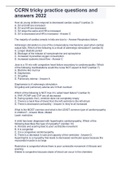Ccrn tricky practice - Study guides, Class notes & Summaries
Looking for the best study guides, study notes and summaries about Ccrn tricky practice? On this page you'll find 19 study documents about Ccrn tricky practice.
Page 2 out of 19 results
Sort by
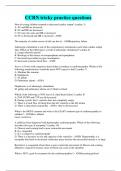
-
CCRN tricky practice questions
- Exam (elaborations) • 33 pages • 2023
-
- $7.99
- + learn more
How do young children respond to decreased cardiac output? (cardiac 3) A. SV and HR are increased B. SV and HR are decreased C. SV stays the same and HR is increased D. SV is decreased and HR is increased - ANSC The majority of cardiac arrests in kids are due to - ANSRespiratory failure Adrenergic stimulation is one of the compensatory mechanisms used when cardiac output fails. Which of the following is a result of adrenergic stimulation? (cardiac 6) A. Longer diastolic period B. Blocka...
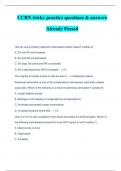
-
CCRN tricky practice questions & answers Already Passed
- Exam (elaborations) • 65 pages • 2023
- Available in package deal
-
- $12.49
- + learn more
CCRN tricky practice questions & answers Already Passed How do young children respond to decreased cardiac output? (cardiac 3) A. SV and HR are increased B. SV and HR are decreased C. SV stays the same and HR is increased D. SV is decreased and HR is increased - C The majority of cardiac arrests in kids are due to - Respiratory failure Adrenergic stimulation is one of the compensatory mechanisms used when cardiac output fails. Which of the following is a result of adrenergic stimulation...
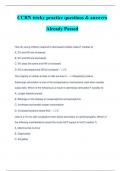
-
CCRN tricky practice questions & answers Already Passed
- Exam (elaborations) • 65 pages • 2023
- Available in package deal
-
- $12.49
- + learn more
CCRN tricky practice questions & answers Already Passed How do young children respond to decreased cardiac output? (cardiac 3) A. SV and HR are increased B. SV and HR are decreased C. SV stays the same and HR is increased D. SV is decreased and HR is increased - C The majority of cardiac arrests in kids are due to - Respiratory failure Adrenergic stimulation is one of the compensatory mechanisms used when cardiac output fails. Which of the following is a result of adrenergic stimulation...
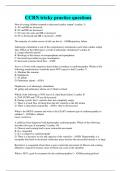
-
CCRN tricky practice questions
- Exam (elaborations) • 33 pages • 2023
-
- $16.49
- + learn more
How do young children respond to decreased cardiac output? (cardiac 3) A. SV and HR are increased B. SV and HR are decreased C. SV stays the same and HR is increased D. SV is decreased and HR is increased - ANSC The majority of cardiac arrests in kids are due to - ANSRespiratory failure Adrenergic stimulation is one of the compensatory mechanisms used when cardiac output fails. Which of the following is a result of adrenergic stimulation? (cardiac 6) A. Longer diastolic period B. Blocka...
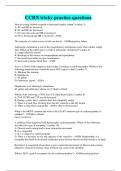
-
CCRN tricky practice questions
- Exam (elaborations) • 33 pages • 2023
-
- $10.49
- + learn more
How do young children respond to decreased cardiac output? (cardiac 3) A. SV and HR are increased B. SV and HR are decreased C. SV stays the same and HR is increased D. SV is decreased and HR is increased - ANSC The majority of cardiac arrests in kids are due to - ANSRespiratory failure Adrenergic stimulation is one of the compensatory mechanisms used when cardiac output fails. Which of the following is a result of adrenergic stimulation? (cardiac 6) A. Longer diastolic period B. Blocka...
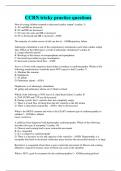
-
CCRN tricky practice questions
- Exam (elaborations) • 33 pages • 2023
-
- $12.49
- + learn more
How do young children respond to decreased cardiac output? (cardiac 3) A. SV and HR are increased B. SV and HR are decreased C. SV stays the same and HR is increased D. SV is decreased and HR is increased - ANSC The majority of cardiac arrests in kids are due to - ANSRespiratory failure Adrenergic stimulation is one of the compensatory mechanisms used when cardiac output fails. Which of the following is a result of adrenergic stimulation? (cardiac 6) A. Longer diastolic period B. Blocka...
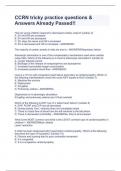
-
CCRN tricky practice questions & Answers Already Passed!!
- Exam (elaborations) • 37 pages • 2023
-
- $11.99
- + learn more
How do young children respond to decreased cardiac output? (cardiac 3) A. SV and HR are increased B. SV and HR are decreased C. SV stays the same and HR is increased D. SV is decreased and HR is increased - ANSWERSC The majority of cardiac arrests in kids are due to - ANSWERSRespiratory failure Adrenergic stimulation is one of the compensatory mechanisms used when cardiac output fails. Which of the following is a result of adrenergic stimulation? (cardiac 6) A. Longer diastolic per...
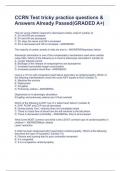
-
CCRN Test tricky practice questions & Answers Already Passed(GRADED A+)
- Exam (elaborations) • 37 pages • 2023
-
Available in package deal
-
- $9.99
- + learn more
How do young children respond to decreased cardiac output? (cardiac 3) A. SV and HR are increased B. SV and HR are decreased C. SV stays the same and HR is increased D. SV is decreased and HR is increased - ANSWERSC The majority of cardiac arrests in kids are due to - ANSWERSRespiratory failure Adrenergic stimulation is one of the compensatory mechanisms used when cardiac output fails. Which of the following is a result of adrenergic stimulation? (cardiac 6) A. Longer diastolic per...
CCRN tricky practice questions and answers 2022

Study stress? For sellers on Stuvia, these are actually golden times. KA-CHING! Earn from your study resources too and start uploading now. Discover all about earning on Stuvia



